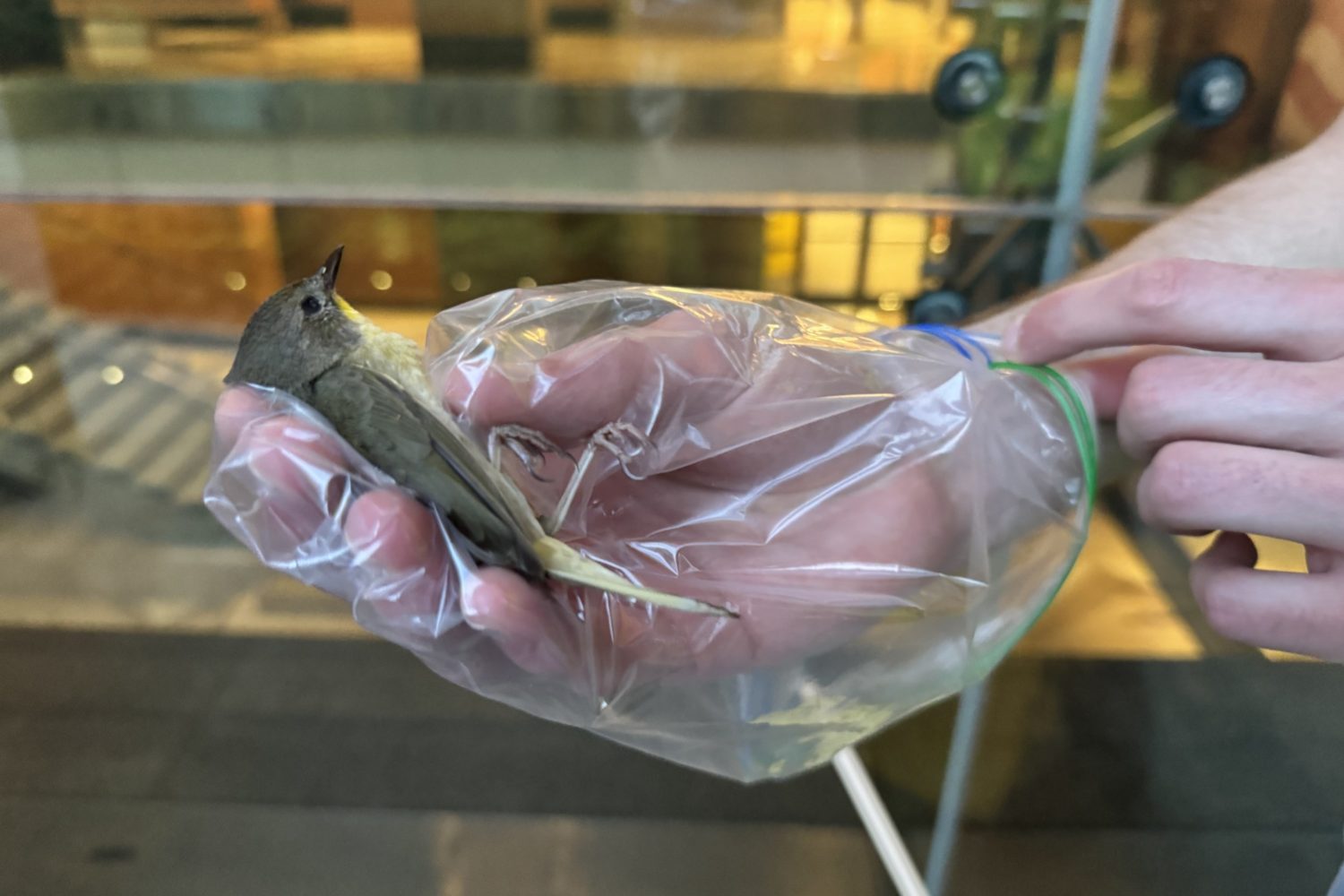In the spring of Kerianne Byrne's junior year, she began a rite of passage for most high schoolers–the college-application process. She took the SATs and scored in the 1200s. She got high marks in Advanced Placement classes in history, English, and mathematics. She had a close relationship with her German teacher, ensuring at least one glowing recommendation.
There was one problem. Kerianne didn't want to go to college. When she told her guidance counselor at Oakton High School, the counselor was surprised.
"You know you can get in, right?" the counselor asked.
Kerianne promised she knew. "I want to learn what I can't learn in a textbook," she said.
The school counselor called Kerianne's parents, Dennie and Eddie. The counselor told them she thought Kerianne might be depressed and recommended she see a therapist.
"We went just to appease the counselor," Dennie says. "The therapist laughed. She said, 'How could a kid who gets up at 5 AM to practice with the swim team, who gets good grades, who works a part-time job, be depressed? Your daughter is fine.' "
She just didn't want to spend four more years in school.
Her parents always knew that Kerianne did not like school. Both college graduates themselves, they encouraged her to take the SATs and get good grades to keep options open. Her mother researched alternative schools like St. John's College in Annapolis, where students study only the "great books."
Her parents finally accepted what their daughter was trying to tell them: Not everyone wants to go to college.
Each year millions of kids finish high school, worried about what the future will bring. Many look for answers in glossy college viewbooks. They flip through pictures of serious students in lecture halls and kids smiling in dorm rooms. They become convinced that a bright future begins in the hallowed halls of the University of Virginia, Loyola College, or Harvard.
No one can deny the benefit of a college degree. "Training has a shelf life of five to seven years," says Maynard Mack, director of the honors program at the University of Maryland. "Education lasts a lifetime."
Going to college has become expected in the middle class–a must-have slip of paper that promises jobs and a crown of intellectual credibility. In his book, The Future of Success, former Secretary of Labor Robert Reich describes the obsession with going to college as part of a desire to find ways to "sell" yourself.
Since the GI Bill was passed in 1944, enrollment at colleges has increased steadily. It continued to grow after Congress enacted the Higher Education Act of 1965, providing grants and loans to children of the working class.
It's not just the government doing the planning. Some parents are thinking about their children's education before they're even born, socking away money into a "college fund."
"We are bred to go to college very early on," says Zoe McGeary, a 20-year-old volunteer with City Year, a program of Americorps. "It doesn't even occur to people not to go."
Zoe went to Edmund Burke School in the District and was the only one in her 1998 class who didn't go to college. She decided to spend a year volunteering in Boston through City Year, running an after-school program for low-income kids. She moved to San Francisco for a summer, where she worked in a grocery store, earning enough to pay rent with a few friends.
The following year Zoe enrolled at a small New England college and earned good grades, but she decided to try City Year again, this time volunteering closer to home in the District. This fall, she is going to Antioch College in Ohio.
"Parents are so afraid if their kids drop out, they'll become losers," says Bob Gilpin, who helps place kids in experiential programs as an alternative to college. There are stories of parents bribing kids with new SUVs or a dream trip around the world if they just bring home a college diploma.
"Washington is an odd bubble," says Peter Spevak, a youth psychologist and director of the Center for Applied Motivation in Rockville and author of Empowering Underachievers: How to Guide Failing Kids to Personal Excellence. "There are a lot of really smart, hardworking parents here. They want their children to do as well as they did."
Spevak's practice is centered around motivating the uninspired student. Some parents bring their kids in because they are getting B's and not all A's–hardly an underachieving child but worrisome to Washington parents obsessing about their child getting into Yale or Duke.
Yet taking time off–anywhere from one semester to a few years–may help kids get into the more competitive colleges. In 1997, William Fitzsimmons, dean of admissions at Harvard University, published an article in the New York Times entitled "Time Out or Burn Out for the Next Generation." In the article, Fitzsimmons encouraged students to take at least a year off.
"Many of us are concerned that the pressures on today's students seem far more intense than those placed on previous generations. College admission–the chance to position oneself for 'success' through the acquisition of the 'right' college degree–looms large," Fitzsimmons wrote. "The pressure can be relentless, even from well-intentioned parents. . . . A 'time out' can take many forms. . . . It is a time to step back and reflect, to gain perspective on personal values and goals, or to gain needed life experience in a setting separate from and independent of one's accustomed pressures and expectations."
Fred Hardagan, dean of admissions at Princeton, has said the same thing–a perfect applicant pool wouldn't include anyone under 21. And many universities, including the University of Maryland and Boston College, give students the option of deferring their admission for at least one year.
It's not that college admissions officers aren't vying for bright, young minds. It's that they've seen firsthand that not every high-school graduate wants to be there.
College for many, is a way to become independent from parents. It has almost become as much about the experience of living on your own as it is about writing ten-page papers about Dante's Inferno.
"There is no 18-year-old who is mature enough to be at college," says Cornelius Bull, who places kids in "time-off" programs and has taught for 20 years in private high schools. "All they've done for the past 12 years is go to school. They need a break from all the 'shoulds.' "
Some parents find out the hard way when their kids flunk out. It's why in the first semester of freshman year the dorms are packed, "but the second semester many of those rooms go dark," says psychologist Peter Spevak.
"We wonder: What is happening to all those other kids?" says John Wittmann Jr., the principal of Chantilly Academy, a Fairfax County career-education program located in Chantilly High School.
With local, state, and federal dollars being poured into schools, taxpayers often want a payback: a high-school graduate who goes to college. Having lots of college-bound seniors brings prestige to local high schools. "College rates make a neighborhood valuable. Buyers want to hear that 80 percent of graduates went to college," says Steve Ackley, a spokesman for the Association for Career and Technical Education.
In 1993 in Montgomery County, counselors pitched college well–75 percent of high-school seniors planned to enroll in college. But according to the county, six years later, only an estimated 44 percent had earned a bachelor's degree.
In a room next to the large, noisy cafeteria of Chantilly Academy, a dozen tables are covered with cotton tablecloths. Teachers, counselors, and a few parents are seated, napkins on their laps. It's May, about a month before graduation. Kerianne Byrne is wearing a white chef's shirt, and she approaches a table with a shy smile.
"Hi, Mom," she says. "Would you like something to drink?"
"I'll have a Diet Coke," replies her mother, who came to Chantilly from McNair Farms Elementary School, where she is a special-education teacher. Kerianne disappears into the kitchen where her teacher, Clay Doubleday, is helping a few kids put the finishing touches on the day's appetizer–beef quesadillas. Kerianne slips out the swinging doors, balancing the Diet Coke and quesadillas, and places them in front of her mother.
"Mmm. These look delicious," Dennie says, picking up a triangle wedge. When her daughter walks back into the kitchen, she leans over to one of the teachers. "If she was my first, I would've pushed harder for her to go to college. I probably would have made that mistake," she says. Kerianne's older sister went to Virginia Tech, her brother to the University of Virginia.
In the months since she decided she wasn't going to go to college, Kerianne is finding her way. Her German teacher told her about a program funded by the German legislature that places 20 American high-school graduates in Germany to live and work for one year. She sent in her application in January, had an interview in Richmond in March, and recently learned she won the fellowship. It pays for all expenses–airfare, room, and board.
She will be working in a restaurant, learning the art of German cooking. Kerianne had been learning culinary techniques for the past year from chef Doubleday at Chantilly Academy. Through the program, she realized how much she enjoyed cooking–it was the first time she felt connected to what she was learning.
And that, says Chantilly Academy director John Wittmann, is the point of career education.
Five years ago, Fairfax county Public Schools held a meeting about the state of their vocational education programs. They set up a task force to study ways to help students explore careers and allow them to graduate with a usable skill. Wittmann was on the panel. "The first thing we realized," he says, "is that we were living in a technology-based economy."
They first decided to fight the stigma associated with vocational education. So they changed the name, from vocational to professional and technical studies. Then the county revamped the curriculum, creating "academies" where students could explore career interests as varied as hotel management and animal science.
Their prized program is in computer science, where juniors and seniors can get certified in MCSE (Microsoft Corporation Systems Engineering), and Fairfax County pays the several hundred dollars for certification. "The county already pays for AP tests and SATs. It's only fair," Wittmann says.
The hope is that these programs will give students direction, whether they are applying to college or not. "Most counselors know about the program, but they are still in the old way of thinking," he says. "They are so hesitant to suggest anything other than college. That's our culture."
Career-education classes have long been considered a lower "track" for students who do not do well academically, and Steve Ackley says this stereotype has not changed much. "Some see it as opening doors; others see it as closing them," he says.
Funding for vocational education in DC's public high schools has decreased over the years. The equipment is old, and schools offer little more than barbering and cosmetology. "A lot of the schools that had career-education programs have been closed," says Cynthia Bell, director of vocational education for DC Public Schools. "I worry that the students are not getting the quality of training they need."
Many bright kids in DC's schools are going to college, but for some of them it is still an unrealistic dream. Fifty-eight percent of DC kids began college last year, but most of the other 42 percent will graduate with few skills. Bell believes that part of the reason there is a lack of funding for vocational education is that people don't want to imply that kids in DC public schools aren't smart enough to go to college.
Growing up, Jake Lee always loved to work on cars. When he was a boy, he would glue together car models. Today, he works for a racing team as a pit mechanic. Although he did well in high school and loved math, he didn't enjoy most of his other classes. He enrolled in Chantilly Academy's automotive-training class his junior year. "It feels good to be able to fix stuff," he says. "I like taking something that looks like junk and making it look new."
Before he graduated in June, he was unsure of his next step. He knew he didn't want to go to a four-year liberal-arts college. He had already been offered a job as an automotive technician. But he was also considering moving to Florida and enrolling at Universal Technical Institute, where he could get certified to work on the engines of motorcycles and large trucks.
"People look at me and say, 'You're not going to college?' And they look at me like I'm stupid," he says. "But I can go to school."
It's just not the "college" most people picture. Most jobs today, whether as a mechanic or a hotel manager, require some postsecondary training. Steve Ackley says members of the Association for Career and Technical Education are trying to get parents, students, and teachers to think broadly about how they define higher education. "For us, it could include community college, trade school, even corporate training," he says. "There are other directions kids can take to be successful other than getting a BA in history."
Sometimes it takes a lifetime to figure out what your passion is, says Nina Marks, a counselor at National Cathedral School in the District. Others, like Jake Lee, know from the time they are young.
There are often reports of successful people who didn't finish college, with Bill Gates probably the most widely known. Here are a few others: Woody Allen, Maya Angelou, John Cheever, Thomas Edison, Joni Mitchell, Nina Totenberg, Ted Turner, Frank Lloyd Wright.
Dozens of others are listed in the book Success Without College by Linda Lee, who offers lots of reasons why students don't need to go to college. The first: If you're going to college to get a better job, you might take a rain check.
What are these jobs? The book High-Skill, High-Wage Jobs, published by the Association of Career and Technical Education, lists more than 50 jobs. An example: Airplane lovers can train to be aircraft mechanics after completing a 2H-year program; they earn as much as $48,000 to start. Liberal-arts graduates usually make around $27,500. The argument, though, is that over a lifetime salaries will grow rapidly for liberal-arts graduates but stall for blue-collar workers.
For many, the less risky option is taking a year–not a lifetime–off from college. At the National Cathedral School, counselor Nina Marks helps students get into the best colleges they can. But she says she always encourages a "gap year," something students have been doing in England for decades. In 1995, the school's top student deferred her admission to Harvard to work on a sheep farm.
This year, a few girls are considering a year off. Angela Barner of Falls Church checked the deferment box on her acceptance letter to Boston College this past May. There was never a question of whether or not she would attend college, she says. But when she walked into Marks's office to tell her she was thinking about deferring, she felt ashamed.
"I kept thinking: What is she going to think of me?" says Barner. But Marks was very positive, throwing out ideas of how she could spend the year. Then Barner had to tell her mother. She brought it up casually over dinner, and her mother immediately wanted to know how, why, to do what?
"My mom's biggest fear was that I wouldn't follow through and go to college," she says. "She didn't realize there was a deferment option. Now she supports it. But it was Mrs. Marks's encouragement that had a lot to do with me making the decision final."
Marks and other guidance counselors often turn to two consultants: Bob Gilpin of Time Out Associates and Cornelius Bull of the Center for Interim Programs. Both offer the college- and non-college-bound hundreds of ways to spend a year.
When Sidwell Friends graduate Michael Palmer didn't get into the schools he wanted, he was referred to Gilpin. Gilpin got to know Michael's interests and then put together a personalized yearlong program: one month spent with a filmmaker on the Maine coast, then an internship at the Shooting Gallery in Manhattan, and three months working at a television-news station in Madrid.
A student who was referred to the Center for Interim Programs spent three months learning wilderness-survival skills in Wyoming and three months working alongside a documentary filmmaker in New York, then went off to work in a dive shop on a central-Pacific island.
Call them rainmakers–the rich parent's panacea to confused and restless children. Bull and Gilpin like to think of themselves as giving kids opportunities they would never have otherwise.
"I could send you around the world for ten years on what people pay for a college education," says Bull. "This generation grew up watching the Discovery Channel. They've seen the world vicariously; now it's time to go experience it themselves."
But it will cost you. Bull has said that he's tried not to make it "a rich man's game." His fee is $1,900 for two years of placement, but airfares and program fees can add up. It's why both Gilpin and Bull stress the abundance of programs that offer room and board. "If a kid works for a summer and saves up a few thousand dollars," says Gilpin, "he could easily spend the next six months doing short-term situations in a few different countries."
Gilpin has taken steps to make his files more accessible to the general public. You can meet one-on-one with him for $1,600 to plan a year and a half of programs. Or visit his Web site, www.timeoutassociates.com, which allows anyone to pay a $50 fee and gain access to thousands of listings–from working at a salmon fishery to interning at a performing-arts center.
"In my generation, the world was a straight-line path," says Gilpin. "This isn't a straight-line world anymore. A year off can recharge your batteries, and when you go to college, you'll have a renewed sense of discovery."
Angela Barner didn't call Gilpin or Bull. She decided she didn't want to spend her year on an expensive adventure. Instead, Barner wants to move to the West Coast and work as a nanny.
"I want to see the world through the eyes of children again," she says. "It will help me see the world fresh."
Barner also wants to explore some of her interests that were pushed to the side because of academics. She loves dance and theater. She plans to enroll in choreography classes and perhaps yoga, pottery, and cooking classes.
"I want those things to become more prominent parts of me," she says.
Taking the year off isn't that stressful, she says, because she knows she will attend Boston College next fall. But stepping away from what "everybody else is doing" can be difficult. It's one reason why admissions officers respect candidates who have taken a year off.
"It takes a really mature student to make a decision like that," says Ronne Patrick, an admissions officer at University of Maryland. "When someone takes a step back and says, 'I want to do it differently,' we really appreciate that."
"I tell them, 'You have 72 years of your life left. What's the hurry?' " says Cornelius Bull. "More and more kids are saying they don't know what they're doing. Everyone has thought about taking time off. If you're older, you'll do college better. Then you'll want to catch fire intellectually. You'll be learning while your friends are out getting drunk."
Bull admits he could go on for hours. Instead, he pauses and sighs, "Education is so wasted on the young." *
Taking a Break From School
Here Are Some Ways to Spend Your Time If College Isn't Your First Choice
Learn to survive in the wilderness. The National Outdoor Leadership School (NOLS) offers two-week to three-month programs, leading groups of students (ages 16 and over) on expeditions worldwide. Spend a month in Alaska mountaineering and sea kayaking ($2,825) or a month backpacking through the Himalayas ($4,200). Financial aid is available, and college credit can be earned (307-332-5300; www.nols.edu). Outward Bound (www.outwardbound.org) offers similar wilderness-survival programs.
A less-expensive way to get outdoors is through the Student Conservation Association, where volunteers serve in national parks, forests, refuges, and urban areas. Volunteers spend three months to a year on projects like restoring vegetation at Yosemite National Park or improving hiking trails in the Grand Canyon. The program is free; housing, food, and equipment are provided. (603-543-1700, www.sca-inc.org).
Make your hobby your full-time passion. One graduate of St. Albans School spent a year pursuing figure skating, while a graduate of Ballou High School decided to start an entertainment-consulting business.
Volunteer. Most local nonprofits and human-service organizations need motivated volunteers. Some national programs also give students plenty of ways to give back. Americorps (800-942-2677, www.americorps.org) offers a few different opportunities for high-school graduates. One is City Year (888-424-8993, www.cityyear.org), a corps of 17- to 24-year-olds who go into low-income neighborhoods to tutor kids, run after-school programs, and help revitalize communities. Americorps Vista volunteers are placed across the country to work in human-service agencies. Members of the Americorps National Civilian Community Corps spend ten months living together and working on projects such as disaster relief. All programs provide a stipend and an educational award upon completion. Note that Peace Corps (800-424-8580, www.peacecorps.org) volunteers do not have to be college graduates.
Go to college on the road. Since the early 1970s, the Audubon Expedition Institute (888-287-2234, www.getonthebus.org) has granted bachelor's degrees in environmental science through "experiential learning." Students travel across the country in a yellow bus and learn by doing. "Our teachers include fjords, coral reefs, ancient forests, barrier islands, desert canyons, Pacific Rim volcanoes, and alpine valleys," reads AEI's Web site. Participants can spend a year on the road and then transfer to another school, or they can travel for their entire four years. The program costs $18,385 a year, including tuition, housing, travel costs, and meals. Financial aid is available.
Travel with a religion-based program. Many Jewish youth choose to spend a year on a kibbutz in Israel, volunteering through the Kibbutz Program Center (800-247-7852, www.kibbutzprogramcenter.org). Students International (559-627-8923, www.stint.com) offers Christian high-school students a chance to travel to Guatemala or the Dominican Republic to do ministry work in areas as varied as agriculture and physical therapy.
Learn to live independently–well, sort of–from Mom and Dad. Worcester, Massachusetts may not be your idea of a dream city, but Dynamy (508-755-2571, www.dynamy.org), a live-and-work program based there, may make it that. Dynamy gives high-school graduates a chance to get an apartment and a job and to live on their own in a new city–all with the safety net of a program staff watching them from a distance and teaching them leadership skills. It costs $15,400 for tuition and housing. Or you can do it on your own for free.
See the world. Some colleges, including Boston University, allow students to study abroad for credit even if they're not enrolled at an institution. Find placements to live and work as an au pair in dozens of countries through eAuPair (www.eaupair.com). Or save up all summer for a semester of travel. Check out The Back Door Guide to Short Term Job Adventures: Internships, Extraordinary Experiences, Seasonal Jobs, Volunteering and Working Abroad by Michael Landes. It provides dozens of detailed program listings.
Call a rainmaker. Bob Gilpin of Time Out Associates (617-698-8977, www.timeoutassociates.com) and Cornelius Bull of the Center for Interim Programs (617-547-0980, www.interimprograms.com) help recent high-school graduates match their interests with year-off programs. They can be expensive, so also seek advice from your school guidance counselor.

















